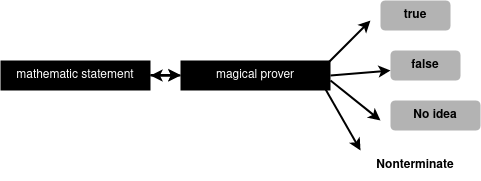Implementing a minimalist mathematical statement prover with Java
Proving things, like mathematical expressions, is serious business. But in general, the theory behind attempted automatic proving is often barbarically complex. To demystify the exercise, I decided that my first article would be about writing an automatic demonstrator of mathematical expressions, in Java, because Java Champions (which I dream of becoming) write programs in Java.
To prove a mathematical statement, it is first important to be able to describe in which system of axioms the statement is to be validated. Next, it is necessary to describe the model used. And yes, even if one would like each axiomatized theory to lead to only one model... this is unfortunately not the case. Typically, there are several models that validate Peano's arithmetic.
Thus, to provide a flexible automatic prover, the class describing the validation engine will need to be parametrised by several other classes. Either, cleverly use parametric polymorphism (the intellectual name of Generics, probably what a Java Champion would say). Well, we can broadly sketch the outline of our prover! For this, we will describe them in an interface!
package io.github.xhtmlboi;
import java.util.Optional;
public interface Prover<Axioms, Model, Statement> {
Axioms getAxioms();
Model getModel();
/**
* A statement that must be verified in the given axioms,
* for the given model
* @param st the statement
* @return Returns an optional containing the result of
* the statement validation. (true for valid, false
* for invalid), if the optional is empty, the
* statement could not be validated or refuted.
*/
Optional<Boolean> run(Statement st);
}
Well this is strange! Why return an optional boolean
(Optional<Boolean>)? A statement is valid or not, what a shame! Here
is a very detailed diagram of what we would like:

But in 1936, on the basis of the incomprehensible (for the not-Java-Champion that I am) paper "**Über formal unentscheidbare Sätze der Principia Mathematica und verwandter Systeme" written by Kurt Gödel in 1931, Alonzo Church and Alan Turing tackled the famous **Entscheidungsproblem (Gottfried Wilhelm Leibniz, yeah, the guy behind the monads, nah not those from the category theory, others, about soul stuff). This leads to some rather annoying problems, or at least sets in stone that some dreams (of Hildebert's for example) will remain dreams forever. Transforming our perspectives in this way:

Now you should understand (unless you were a Java Champion and you would have already understood) why use an option?
result.get() == truethe statement is valid;result.get() == falsethe statement is invalid;result.isEmpty()the prover cannot validate the statement.
But what about the nonterminaison? Just think about it... if we can't prove that a program terminates... how could we ask our statement checker to tell us that the statement does not terminate? But don't panic, the concrete implementation I will give you can never nonterminate! Without further ado, here is a class that implements our interface, let me introduce "Ein Super Automatischer Prüfer Der Immer Fertig Wird" (Some will notice how I want to avoid controversy by deliberately choosing a name that has no ambiguous connotations in another language. A little tip, if you want to find a name for a project and you absolutely want to avoid offending someone, or a whole community... nothing could be easier, translate a sentence into German):
package io.github.xhtmlboi;
import java.util.Optional;
public class EinSuperAutomatischerPrüferDerImmerFertigWird<Axioms, Model, Statement>
implements Prover<Axioms, Model, Statement> {
protected Axioms axioms;
protected Model model;
public EinSuperAutomatischerPrüferDerImmerFertigWird(Axioms axioms, Model model) {
this.axioms = axioms;
this.model = model;
}
@Override
public Axioms getAxioms() {
return this.axioms;
}
@Override
public Model getModel() {
return this.model;
}
@Override
public Optional<Boolean> run(Statement st) {
return Optional.empty();
}
}
To avoid the risk of evaluating a statement that may not finish... just don't evaluate it and always return an acceptable answer: "I don't know". According to Gödel, Church and Turing... this answer is quite acceptable (sometimes... but all the time is "a kind of sometimes").
It's great, by respecting all the principles of Clean Code, using a hint of design pattern and showing an uncommon intelligence, we have, in few lines (which, in Java is a feat), succeeded in building a very formal software that always returns the right answer. The least I can say is that Java excels at this kind of exercise! You should use it often. Another positive point is that this software can probably run on any machine (provided it has a JVM installation compatible with the byte code of the distributed software). And, even more deep, because the verification algorithm is so clear, it is possible to run it without a JVM... and even without a computer. For example... close your eyes, think very hard about a mathematical statement, then simply say to yourself that you have no idea of the validity of that statement. So far so good.
To conclude... is this software useful? Probably not for
intelligently checking mathematical statements or programs. But it
has the merit to demonstrate my quality as a Java programmer and my
eligibility to become a Champion. Although the lack of explicit
sums (as opposed to products) forces me to use an optional, rather
than an explcite sum: Valid | Invalid | Dont_know, but hey, that's
just functional programmer's flair (and yes, I am aware of the
existence of enums, but I find that even if it would have been
possible to represent the form I am proposing, it would have, firstly,
spoiled the substance of my article and apart from this aspect, they
propose a rather limited version of sums).
I hope you enjoyed reading this, and see you soon for new articles!